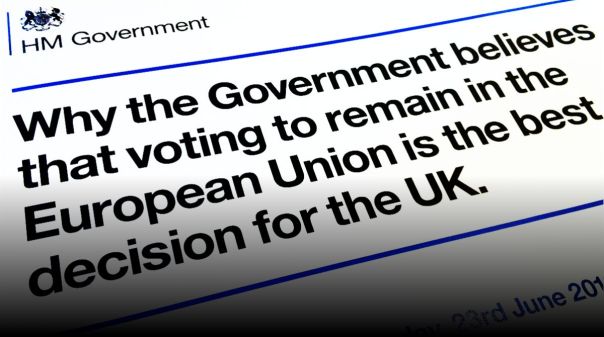Whatever is decided on 23rd June, the show will go on

Referendums may seem like a good idea and, doubtless, they have their place in a working democracy, but they have a way of polarising society in a manner that general elections do not.
On both sides of the Atlantic there is a dangerous disconnect between the rulers and the ruled. That is why, I suspect, such unlikely characters as Jeremy Corbyn and Donald Trump have confounded all expectations and caused us to believe that, in the current febrile atmosphere, virtually anything in politics can happen. The same disconnect can be said of the unelected and unaccountable gnomes of Brussels. At the moment we are cynically digesting the latest piece of hyperbole concerning the coming EU referendum and await with trepidation the next shocking apocalyptic revelation.
Genocide and war, they tell us, is a possible consequence if we make the wrong decision, as is a five-million rush to these crowded shores to swell our already ballooning numbers. The ten plagues of Egypt must surely be in the pipeline as the next possible item on the agenda. Which side will jump in with its own 21st century version of these horrors to scare the living daylights out of us is anybody’s guess. Is the public buying any of this nonsense? I suspect not.
Forecasts are notoriously unreliable. We spend billions worldwide trying to predict the weather and still we get it wrong. In the seventies, National Geographic featured scientists forecasting another ice age. In the 1920s, economists were convinced that a return to the gold standard would cure our economic woes. It made them worse. When Mrs Thatcher proposed her remedies, 364 leading economists signed a letter to say they would not work. They did. When the three party leaders, the entirety of the establishment and almost all the chattering classes said we should join the European Exchange Rate Mechanism in the early 1990s, the ERM, they were wrong again. Many of the same group of know-alls also wanted us sign up to the euro and predicted doom if we did not. How lucky for us that we declined to listen to them. “We would be able to do our business in Afghanistan without loss of life,” said the defence minister. Nearly 500 died. 13,000 would come to us from Eastern Europe, said Labour. Over 1,000,000 did. When George Osborne proposed austerity, Christine Lagarde, the head of the IMF, rushed in saying he was “playing with fire.” We ended up with the highest growth rate in the western world and over 2 million new jobs created. The governor of the Bank of England said it would be necessary to put up interest rates when employment fell below 7%. It was not.
So much for the “experts” knowing what will happen. Why should we take any of their forecast seriously?
Referendums may seem like a good idea and, doubtless, they have their place in a working democracy, but they have a way of polarising society in a manner that general elections do not. Perhaps it is because they concern huge and generational issues, the results of which cannot be unpicked five years down the line when you realise you got it wrong. Whatever the reason, they seem to generate a level of bitterness unique to themselves. Remember the nastiness of some of the SNP zealots in 2014? Had I been a unionist at that time, I certainly would have thought it prudent to keep my head down and definitely not put a poster in my Glasgow flat window.
The truth is that whatever is decided on 23rd June, the show will go on and the good ship Great Britain Plc. will plough on much as it did throughout all those centuries before the European Union was even heard of.
At this moment in history it cannot be denied that the EU is going through a rough patch. The euro may yet implode; even moneybags Germany has not enough to save beleaguered Spain, never mind troubled Italy if the markets call time on them. The single currency was certainly ill-conceived and has massive problems which have yet to be addressed. As for the Schengen Zone – that great leap of idealism – it poses a huge security risk in this volatile, post-9/11 world and it could be dynamite, literally. The EU’s policies are driving extremism in Europe leading to the rise of neo-Fascist parties. In terms of job creation, the EU is currently a disaster area and its growth rates is abysmal (on both of these counts we are an exception). A good case, you might argue for the Brexit. Why cling to a loser?
At the same time, you might equally argue that to cut ourselves loose might be to put ourselves on the wrong side of history. As well as staying at peace, a continent united is obviously going to be able to make its voice heard loudly in the world and its trade deals carry enormous clout.
Europe’s whole history since Rome fell apart has been to find a way of getting back together again. Various of its more powerful states have sought to do it under their own hegemony, but that has been unacceptable to the rest. Europe’s glory, and you have to say achievement, today is that it has found a way of doing so largely by consent rather than by coercion. Yet unfortunately in many important areas it has messed up and its democratic credentials are seriously flawed.
Perhaps a vote to leave might provide the system with the jolt it needs to make it acceptable, not just to us but to others who do not wish to see their identity subsumed in a monolithic super state which wishes to homogenise them all into a blandness and make all Europe seem the same. If Europe is to succeed a way must be found to preserve its charming idiosyncrasies as well as a meaningful level of sovereignty for its nation states.
Posted on May 24, 2016, in Europe, UK and tagged EU referendum, Project Fear. Bookmark the permalink. Leave a comment.

Leave a comment
Comments 0